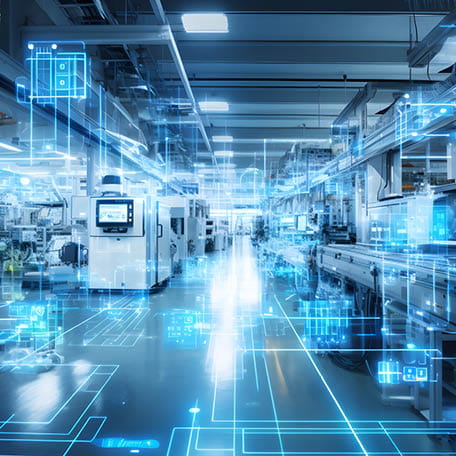Artificial intelligence (AI) has been the buzzword for some time with rarely a day going by without talk of how the technology sector is being transformed by the latest AI-related innovations.
We recently returned from a recent research trip to Silicon Valley and Boston – the world’s leading tech and innovation hubs – a visit which highlighted a number of significant developments that look set to have far-reaching impacts for industry, businesses, consumers and investors.
These are:
1. AI is transforming the software industry – enterprise software companies now face new competition from AI startups aiming to disrupt incumbents in this highly profitable sector.
2.Large Language Model training clusters are set to expand significantly – Nvidia Blackwell graphics processing units (GPUs), launching later this year, will be used to build the first 100MW GPU training clusters, with the next goal being 1GW clusters.
3. Apple is poised to lead us into a super cycle of edge computing upgrades – following a significant downturn in PCs, tablets, and smartphones, consumers will need to upgrade their devices to support AI functionality due to the high memory demands of AI.
AI is transforming the software industry: In 2017, Jensen Huang famously predicted on LinkedIn that “AI will eat software”. While it is still early days, this vision is beginning to come true, as AI brings new, more functional, and cost-effective software to market. Unlike traditional Software-as-a-Service (SaaS) offerings, these AI-driven solutions automate, enhance productivity and offer a solution at a fraction of the price. If AI drives the cost of coding software to zero, the question becomes, why buy software versus building your own?
We believe that AI's potential to permeate every aspect of the economy is immense, akin to the transformative impact of electricity. It is poised to touch every pound of GDP, reshape industries, and drive substantial productivity gains.
A prime example of this shift is the emergence of companies such as Harvey.ai, a legal AI assistant built on OpenAI’s GPT platform, which exemplifies how AI can revolutionise traditional sectors. By automating tasks such as legal research, document drafting, and contract analysis, Harvey.ai enhances efficiency and accuracy for legal professionals.
Harvey.ai has demonstrated its ability to reduce task times by 20-50%, significantly cutting costs and increasing capacity for handling clients. Its custom-trained models tailored to legal needs have seen widespread adoption among top-tier legal professionals and firms including Allen & Overy, PwC, Wolters Kluwer, and Baker McKenzie.
Baker McKenzie utilised Harvey.ai to analyse and compare clauses in commercial real estate leases, saving over $1 million in costs. Wolters Kluwer reduced the average time for drafting legal memos from 4.5 hours to just 1.5 hours with Harvey.ai.
As AI continues to evolve, its impact on software and various industries is expected to be profound, validating Jensen Huang's prediction.
Large language model (LLM) training clusters are set to expand significantly: In the past seven years, a critical realisation has emerged in AI development – the scale of compute matters significantly. By increasing both compute power and data, we can train better models, thereby broadening the application of AI and unlocking substantial revenue opportunities across the economy.
This trend, evident since 2017, is expected to continue for at least another five years, strengthening the fundamentals and stock prices of companies that supply GPUs and networking equipment for AI data centres, as well as those that manufacture the equipment for these components.
The underlying assumption is that more compute leads to more advanced LLMs, which opens up new use cases for AI. This has driven the strategic decisions of major corporations, including Microsoft, Alphabet, and Goldman Sachs.
Demand for these clusters is evident across major technology companies and even sovereign AI initiatives such as Qatar. As AI technology progresses, each new LLM vintage introduces new sources of demand, driving further growth in compute scale. This underscores the transformative potential of compute power in shaping the future of AI.
Apple is poised to lead us into a super cycle of edge computing upgrades: After a challenging couple of years for edge computing, a significant upgrade cycle is on the horizon for devices such as smartphones, PCs, and laptops. This anticipated surge in upgrades is driven primarily by the need to accommodate new operating systems like iOS 18 and Windows 12, both set to launch later this year or early next year.
These new operating systems are designed to enable consumers to utilise AI functionalities directly on their devices, necessitating substantial increases in memory capacity. The upcoming Windows 12, for instance, will demand a hefty 16 GB of RAM, a significant leap from the 4 GB required by Windows 11 and the mere 1 GB needed for Windows 10.
Similarly, iOS 18 will also push the memory requirements of smartphones, necessitating upgrades to ensure optimal performance and to leverage the advanced AI capabilities embedded within the new operating system. This shift marks a substantial escalation in hardware requirements, reflecting the growing complexity and capability of contemporary software.
This upgrade cycle is poised to benefit not only major companies such as Apple and Arm but also smaller firms such as Onto Innovation and Ultra Clean technologies. These companies are integral to the supply chain, providing essential components and technologies that support the enhanced memory and processing needs of modern devices. As a result, they are likely to see increased demand and potential growth opportunities.
This transition is not without its challenges, however. The entire value chain is currently experiencing significant bottlenecks, particularly evident in memory inventory levels. These constraints highlight the strain on supply chains as manufacturers scramble to meet the heightened demand for upgraded components. This scarcity underscores the urgency for strategic planning and investment in production capacities to mitigate the risks associated with supply shortages.
Despite this, the advancements we are witnessing today in innovation across the technology sector fill us with optimism for the future, and we eagerly anticipate the transformative developments the next decade will bring.
KEY RISKS
Past performance is not a guide to future performance. The value of an investment and the income generated from it can fall as well as rise and is not guaranteed. You may get back less than you originally invested.
The issue of units/shares in Liontrust Funds may be subject to an initial charge, which will have an impact on the realisable value of the investment, particularly in the short term. Investments should always be considered as long term.
The Funds managed by the Global Innovation Team:
May hold overseas investments that may carry a higher currency risk. They are valued by reference to their local currency which may move up or down when compared to the currency of a Fund. May have a concentrated portfolio, i.e. hold a limited number of investments. If one of these investments falls in value this can have a greater impact on a Fund's value than if it held a larger number of investments. May encounter liquidity constraints from time to time. The spread between the price you buy and sell shares will reflect the less liquid nature of the underlying holdings. Outside of normal conditions, may hold higher levels of cash which may be deposited with several credit counterparties (e.g. international banks). A credit risk arises should one or more of these counterparties be unable to return the deposited cash. May be exposed to Counterparty Risk: any derivative contract, including FX hedging, may be at risk if the counterparty fails. Do not guarantee a level of income.
The risks detailed above are reflective of the full range of Funds managed by the Global Innovation Team and not all of the risks listed are applicable to each individual Fund. For the risks associated with an individual Fund, please refer to its Key Investor Information Document (KIID)/PRIIP KID.
DISCLAIMER
This is a marketing communication. Before making an investment, you should read the relevant Prospectus and the Key Investor Information Document (KIID), which provide full product details including investment charges and risks. These documents can be obtained, free of charge, from www.liontrust.co.uk or direct from Liontrust. Always research your own investments. If you are not a professional investor please consult a regulated financial adviser regarding the suitability of such an investment for you and your personal circumstances.
This should not be construed as advice for investment in any product or security mentioned, an offer to buy or sell units/shares of Funds mentioned, or a solicitation to purchase securities in any company or investment product. Examples of stocks are provided for general information only to demonstrate our investment philosophy. The investment being promoted is for units in a fund, not directly in the underlying assets. It contains information and analysis that is believed to be accurate at the time of publication, but is subject to change without notice. Whilst care has been taken in compiling the content of this document, no representation or warranty, express or implied, is made by Liontrust as to its accuracy or completeness, including for external sources (which may have been used) which have not been verified. It should not be copied, forwarded, reproduced, divulged or otherwise distributed in any form whether by way of fax, email, oral or otherwise, in whole or in part without the express and prior written consent of Liontrust.














